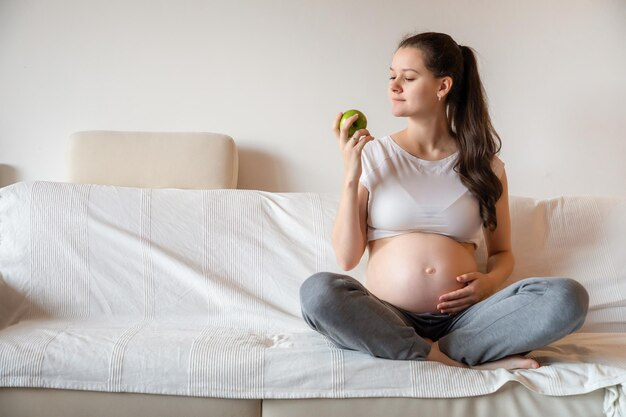
Pregnancy is a crucial time for both the mother and the developing fetus. It is widely recognized that pregnant women need to pay careful attention to their diet, as the health and nutrition of the mother directly impact the growth and development of the baby. During pregnancy, a woman's immune system undergoes changes, making her more susceptible to infections. This is why being mindful of food choices is essential for protecting both the mother’s health and the fetus’s well-being.
Understanding the Risks: Listeria and Other Bacteria
Before delving into specific foods to avoid, it's important to highlight a particular concern:
Listeria monocytogenes
This bacteria can cause listeriosis, a rare but potentially severe infection that poses serious risks to pregnant women and their babies. Pregnant women are about 10 times more likely to contract listeriosis than the general population, which can lead to complications such as miscarriage, stillbirth, and severe illness in newborns.
To reduce the risk of exposure to harmful bacteria, proper food handling and preparation are crucial. Always wash your hands after handling raw foods and ensure that all fruits and vegetables are thoroughly washed before consumption.
Foods to Avoid During Pregnancy
Here’s a comprehensive list of foods that pregnant women should avoid, along with explanations for each:
Raw Foods

Fish
Raw fish, such as sushi and sashimi, poses a high risk of exposure to parasites and harmful bacteria. While fish is a nutritious source of omega-3 fatty acids, it's essential to consume it cooked. Safe options include salmon, tilapia, and cod, which can be enjoyed in various dishes.
Shellfish
Raw shellfish, particularly oysters, can harbor dangerous pathogens. These should be completely avoided during pregnancy. Cooked shellfish, such as shrimp and crab, are safe choices.
Fish with High Mercury Content
While fish is generally healthy, some types contain high levels of mercury, which can negatively affect fetal development, particularly the brain and nervous system. The following guidelines can help you make safe choices:
2 to 3 servings per week of low-mercury fish (e.g., salmon, trout, herring).
1 serving per week of moderate mercury fish like orange roughy or catfish, without consuming other fish that week.
1 serving per fortnight of high-mercury fish such as shark, swordfish, or marlin, ensuring no other fish is eaten during that time.
Deli Meats
Processed meats such as cold cuts, hot dogs, and smoked fish can be contaminated with Listeria. If you choose to consume these, ensure they are heated to steaming hot to kill any harmful bacteria.
Unwashed Fruits and Vegetables

Fresh produce is vital for a healthy diet, but it can also be a source of bacteria and parasites. Always wash fruits and vegetables thoroughly under running water, even if you plan to peel them. This simple step helps eliminate contaminants and reduce the risk of foodborne illness.
Raw Eggs
Raw or undercooked eggs can carry Salmonella, which can cause food poisoning. Avoid dishes that contain raw eggs, such as homemade mayonnaise, Caesar salad dressing, and certain desserts like tiramisu. Instead, ensure that eggs are fully cooked until both the white and yolk are firm.
Unpasteurized Dairy Product
Products such as unpasteurized milk, cheese, and yogurt can contain harmful bacteria, including Listeria. Opt for pasteurized options to minimize risk.
Alcohol
Alcohol consumption during pregnancy is strongly discouraged. There is no known safe amount, and drinking can lead to fetal alcohol spectrum disorders (FASD), which can cause lifelong developmental issues. It's best to abstain entirely.
Caffeine
While moderate caffeine consumption may be considered safe for some pregnant women, it's wise to limit intake. High amounts of caffeine have been linked to an increased risk of miscarriage and low birth weight. Consult your healthcare provider for personalized recommendations.
Maintaining a balanced diet during pregnancy is vital for both the mother’s and the baby’s health. By avoiding certain high-risk foods and following safe food handling practices, expectant mothers can significantly reduce the risk of foodborne illnesses. Always consult with a healthcare provider or a registered dietitian for personalized dietary advice tailored to your specific needs. A nutritious diet, rich in fruits, vegetables, whole grains, and lean proteins, will support a healthy pregnancy and the development of your baby.
References:
Amylia Ryan, (June 13, 2024), From Deli Meats to Unwashed Produce, Here’s the Food to Avoid When Pregnant
https://www.babylist.com/hello-baby/foods-to-avoid-during-pregnancy
The Healthline Editorial Team, (August 10, 2017), Fetal Alcohol Syndrome
https://www.healthline.com/health/fetal-alcohol-syndrome
Foodstandards, (6 December 2020), Mercury in fish
https://www.foodstandards.gov.au/consumer/chemicals/mercury
NHS, (19 May, 2023), Foods to avoid in pregnancy





